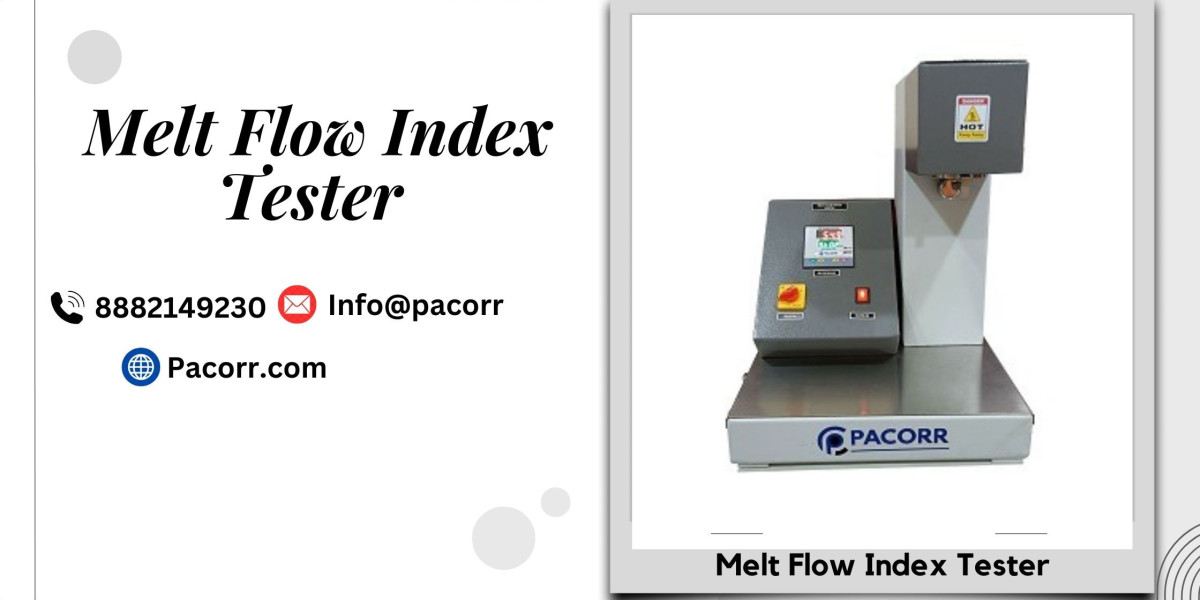Introduction: Understanding the Importance of Melt Flow Index Testing
In the world of polymer processing and quality control, understanding the flow characteristics of a material is essential to ensure its suitability for manufacturing and end-use applications. The Melt Flow Index Tester is a crucial property that measures the ease with which a polymer flows when heated, providing insight into its viscosity, processability, and performance.
In this blog, we will delve deeper into the functionality, features, applications, and benefits of the Melt Flow Index Tester. If you're looking to improve your testing process or need reliable equipment for quality control, understanding the significance of MFI testing and the capabilities of the Melt Flow Index Tester is essential.
What is the Melt Flow Index (MFI)?
The Melt Flow Index (MFI), also referred to as the Melt Flow Rate (MFR), is a measurement of the amount of polymer that flows through a specific-sized orifice under standardized conditions. The test involves placing a polymer sample into a heated chamber where it is forced through the orifice under a specific load. The time it takes for a set amount of polymer to pass through the orifice is recorded, which gives the Melt Flow Index value.
The Melt Flow Index Testing is typically measured in grams per 10 minutes (g/10min) and serves as an indicator of the material's molecular weight and viscosity. A high MFI suggests the polymer is less viscous and more easily processed, while a low MFI indicates higher viscosity and more resistance to flow.
How the Melt Flow Index Tester Works
The Melt Flow Index Tester operates by heating a sample of polymer to a predetermined temperature, usually between 190°C and 300°C, depending on the type of polymer being tested. A fixed weight or load is applied to the molten polymer, forcing it to flow through an orifice of a specific diameter. The amount of polymer extruded over a set period is measured and recorded.
There are two key variables that influence the test results:
- Temperature: The polymer sample is heated to a consistent temperature to ensure uniform testing conditions. Temperature affects the flow rate, so precise control is necessary to avoid errors.
- Load: A standardized weight is placed on top of the molten polymer, and the force of gravity helps push the material through the orifice. Different loads can be used depending on the test conditions specified by the standard being followed (e.g., ASTM or ISO standards).
Features of the Melt Flow Index Tester
When selecting a Melt Flow Index Tester, there are several features and specifications to consider. Pacorr’s Melt Flow Index Tester comes equipped with advanced features that enhance the accuracy, reliability, and ease of use:
- Accurate Temperature Control: The tester maintains a precise temperature control system that allows for accurate MFI testing at various temperatures. This ensures that the sample is heated uniformly, eliminating discrepancies in testing results.
- User-Friendly Interface: With an intuitive control panel, the tester allows easy operation. The user interface displays crucial information, such as test results, temperature settings, and sample size, to ensure smooth testing and result interpretation.
- Automatic Measurement: Automated measuring systems track the amount of polymer extruded through the orifice. This reduces human error and ensures more consistent results, leading to higher testing efficiency.
- Multiple Standards Compliance: The Melt Flow Index Tester from Pacorr adheres to various international standards, including ASTM, ISO, and DIN, ensuring that testing is compliant with industry benchmarks.
- High Precision and Sensitivity: The tester is built to provide highly accurate readings, which is essential when analyzing polymers used in critical applications. The precision ensures that even slight changes in the material's viscosity can be detected.
- Easy Calibration: The device can be easily calibrated, ensuring that every test is performed with the utmost accuracy, regardless of the number of tests performed.
Applications of the Melt Flow Index Tester
The Melt Flow Index Tester is indispensable in several industries that rely on polymer materials. Below are some common applications where the MFI test is crucial:
1. Polymer Manufacturing
In polymer manufacturing, the MFI value helps determine how easily raw polymer materials can be processed into final products. It is essential for manufacturers to have a reliable Melt Flow Index Tester to ensure that polymers meet specific processing and quality standards.
2. Quality Control and Consistency
MFI testing is an essential component of quality control in polymer production. It ensures that the material exhibits the desired flow behavior, leading to better molding, extrusion, and other processing operations. Pacorr’s Melt Flow Index Tester Price helps maintain consistent product quality by enabling frequent testing of raw materials and finished products.
3. Material Research and Development
In research and development, understanding the melt flow properties of a material is critical for developing new polymer formulations. The Melt Flow Index Tester allows R&D teams to assess various formulations under different test conditions, enabling them to create materials that perform optimally in real-world applications.
4. Regulatory Compliance
Many industries are required to adhere to strict material quality standards set by government agencies and industry regulators. Using the Melt Flow Index Tester ensures that manufacturers meet regulatory standards, reducing the risk of non-compliance and ensuring safety in the end products.
Benefits of Using a Melt Flow Index Tester
There are numerous benefits to incorporating the Melt Flow Index Tester into your polymer testing process. These benefits include:
- Improved Product Quality: Regular testing of polymers ensures that only materials with appropriate flow properties are used in manufacturing. This helps avoid defects during processing, ensuring the final product meets high-quality standards.
- Cost-Effective Production: By monitoring the flow properties of raw materials, manufacturers can optimize the use of resources, reduce waste, and improve the efficiency of their operations, ultimately leading to cost savings.
- Faster Processing Times: The Melt Flow Index Tester enables manufacturers to quickly assess the flow characteristics of polymers, reducing the time spent on testing and improving overall production efficiency.
- Better Process Control: The tester provides valuable insight into the processability of polymers, allowing manufacturers to adjust processing parameters, such as temperature and pressure, to achieve the desired outcomes.
- Enhanced Product Development: For companies involved in R&D, the tester provides valuable data that helps in the development of new materials with specific characteristics, thus fostering innovation.
Conclusion: Why Choose Pacorr’s Melt Flow Index Tester?
The Melt Flow Index Tester is an essential tool for industries involved in polymer processing, quality control, and research. With its precise temperature control, user-friendly design, and compliance with international standards, Pacorr’s Melt Flow Index Tester offers unmatched performance and reliability.
For manufacturers, ensuring that your polymers have the right flow characteristics is crucial for product quality and production efficiency. By choosing Pacorr for your Melt Flow Teste needs, you can be assured of high-quality instruments that adhere to global standards.
Ready to improve your polymer testing process? Visit pacorr.com to learn more about our Melt Flow Index Tester and how it can help elevate your testing and quality control processes.






